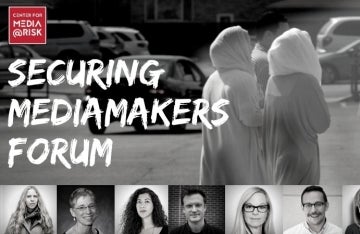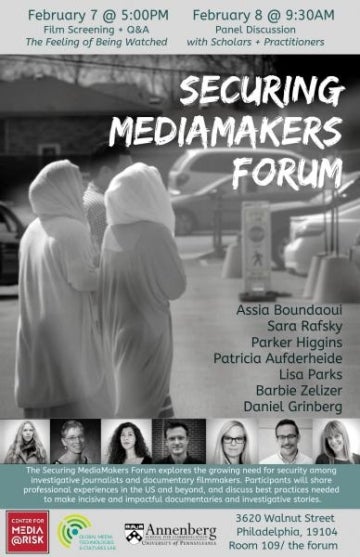
Center for Media at Risk Forum: Securing MediaMakers
- Annenberg School, Room 109
Featuring Lisa Parks, Assia Boundaoui, Parker Higgins, Sara Rafsky, Patricia Aufderheide, Daniel Grinberg, and Barbie Zelizer
The Securing MediaMakers Forum explores the growing need for security — ranging from data encryption to legal teams to protected work environments — among investigative journalists and documentary filmmakers. While this is an historical issue, panelists address these issues in the contemporary context, calling out First Amendment erosions brought by the Trump administration and his sanctioning of threats and contempt for journalists and political opponents. Participants will share professional experiences in the US and beyond, and discuss best practices needed to make incisive and impactful documentaries and investigative stories. Questions to be addressed include: How has the spectrum of "who" is at risk been broadened in the current political climate? What steps can one take to ascertain whether their work is being monitored surreptitiously? What security tools or tactics have journalists and filmmakers found most helpful and useful in ensuring their work gets produced? What tips do professionals have for students interested in pursuing careers in these fields?
About the Speakers
Lisa Parks is a media scholar whose research focuses on three areas: satellite technologies and media cultures; critical studies of media infrastructures; and media, militarization and surveillance. Parks is the author of Cultures in Orbit: Satellites and the Televisual (Duke UP, 2005), Rethinking Media Coverage: Vertical Mediation and the War on Terror (Routledge, 2018) and Mixed Signals: Media Infrastructures and Cultural Geographies (in progress). She has been a PI on major research grants from the National Science Foundation and the US State Department, and has collaborated with artists and computer scientists. She is committed to exploring how greater understanding of media systems can inform and assist citizens, scholars and policymakers in the US and abroad to advance campaigns for technological literacy, creative expression, social justice and human rights. Before joining the CMS/W faculty, Parks was Professor and former Department Chair of Film and Media Studies at UC Santa Barbara, where she also served as Director of the Center for Information Technology and Society.
Assia Boundaoui is an Algerian-American journalist and filmmaker based in Chicago. She has reported for the BBC, NPR, PRI, Al Jazeera, VICE, and CNN. Her debut short film about hijabi hair salons for the HBO LENNY documentary series premiered at the 2018 Sundance Film Festival. Her feature length debut THE FEELING OF BEING WATCHED, a documentary investigating a decade of FBI surveillance in Assia's Muslim-American community, had its world premiere at the 2018 Tribeca Film Festival. She is currently a fellow with the Co-Creation Studio at the MIT Open Documentary Lab, where she is iterating her most recent work, the Inverse Surveillance Project. Assia has a Masters degree in journalism from New York University and is fluent in Arabic.
Parker Higgins is the Director of Special Projects at the Freedom of the Press Foundation. He is an artist, activist and developer whose writing has appeared in Wired, Gizmodo, Techdirt, PBS Media Shift and The New Inquiry and whose work has been covered in outlets such as Newsweek and NPR. Parker was previously the Director of Copyright Activism at the Electronic Frontier Foundation, where he wrote and spoke extensively about the importance of the open Web and its role in resisting censorship and surveillance. He is a graduate of NYU's Gallatin School of Individualized Study and an alum of Recurse Center in New York.
Sara Rafsky is a writer and researcher who works at the intersection of journalism, press freedom, human rights and documentary film in the US and Latin America. Sara is currently a Senior Research Fellow at the Tow Center for Digital Journalism at Columbia University, where she leads research on local news, and the Safe + Secure Executive-at-large at Doc Society, where she works on an initiative to mitigate risks faced by documentary filmmakers. She was previously a researcher at the Open Documentary Lab at MIT and a Google News Lab Fellow at Witness. Prior to that she was the Researcher on Central America at Amnesty International in Mexico City and the Americas Research Associate for the Committee to Protect Journalists in New York. Sara has written about culture and politics as a freelance journalist in New York, South America and Southeast Asia. In 2008, she received a Fulbright Grant to research photojournalism and the Colombian armed conflict. She has a BA from Georgetown University and an MS in Comparative Media Studies from MIT.
Patricia Aufderheide is a scholar on media and social change and Professor of Communication Studies at American University in Washington, D.C. She founded the School's Center for Media & Social Impact, where she continues as Senior Research Fellow. Her books include Reclaiming Fair Use: How to Put Balance Back in Copyright (University of Chicago), with Peter Jaszi; Documentary: A Very Short Introduction (Oxford), The Daily Planet (University of Minnesota Press) and Communications Policy in the Public Interest (Guilford Press). She has been a Fulbright Research Fellow twice, in Brazil (1994-5) and Australia (2017). She is also a John Simon Guggenheim fellow (1994) and has served as a juror at the Sundance Film Festival among others.
Daniel Grinberg received his Ph.D. from the Department of Film and Media Studies at the University of California, Santa Barbara. He is currently the Postdoctoral Fellow at the Center for Media at Risk at University of Pennsylvania's Annenberg School for Communication. Previously, he received a M.A. in Communication and Culture at Indiana University and a B.A. in English Literature and Foreign Affairs at the University of Virginia. In between, he also taught English at a high school in France and embarked on an ongoing quest to watch every film in the Criterion Collection. Currently, he is at work on his first book, Partial Disclosures: Documentary Media and the Freedom of Information Act, which examines how documentary media and FOIA disclosures mediate public knowledge of covert security and surveillance practices. He has also written on topics such as terror watchlists, virtual reality simulations, predictive security algorithms, and the militainment network of the Guantanamo Bay Naval Base. His research interests include government media and censorship, war and security media, surveillance, documentary media, media activism, and media and the environment in both U.S. and global contexts. He is also the co-editor of the "Surveillance States" issue of Media Fields Journal; the co-organizer of the University of California Humanities Research Institute "War, Security, and Digital Media" Graduate Working Group; and the co-organizer of the Power Dynamics: 2016 Media and the Environment Conference and Ruins: 2017 Media Fields Conference.
Barbie Zelizer is the Raymond Williams Professor of Communication and Director of the Center for Media at Risk at the University of Pennsylvania’s Annenberg School for Communication. A former journalist, Zelizer is an expert on journalism, culture, memory and images in times of crisis. Author of fourteen books—including the award-winning About To Die: How News Images Move the Public (Oxford 2010)—and over 150 articles and essays, she is a Peabody Media Fellow and has received fellowships from the Guggenheim Foundation, Freedom Forum Center, Harvard University, Fulbright Senior Scholars, Stanford University’s Center for Advanced Study in the Behavioral Sciences and the Helsinki Collegium for Advanced Studies. Zelizer is also a media critic, whose work has appeared in The Nation, PBS News Hour, Liberation, CNN, Huffington Post, Newsday and other media organs. Coeditor of Journalism: Theory, Practice and Criticism, she is a former member of the board of jurors of the George Foster Peabody Awards and a past president of the International Communication Association. Zelizer was Director of the Scholars Program for Culture and Communication for 14 years before its transition into the Center for Media at Risk. She is working on a project titled How the Cold War Drives the News, for which she has received an ACLS Fellowship for 2018-2019.
Schedule

Thursday, February 7th
- 5:00pm Light Reception
- 5:30pm Film screening: The Feeling of Being Watched + Q&A with Assia Boundaoui
- 7:30pm Wine Reception
Friday, February 8th
- 9:30am – 10:00am Breakfast
- 10:00am – 12:15pm Panel Discussion with Parker Higgins, Sara Rafsky, and Patricia Aufderheide
- 12:15pm Lunch
Co-Sponsored with the Global Media Technologies and Cultures Lab in the Department of Comparative Media Studies at MIT.
Hosted by Barbie Zelizer and Lisa Parks
Events
View All
